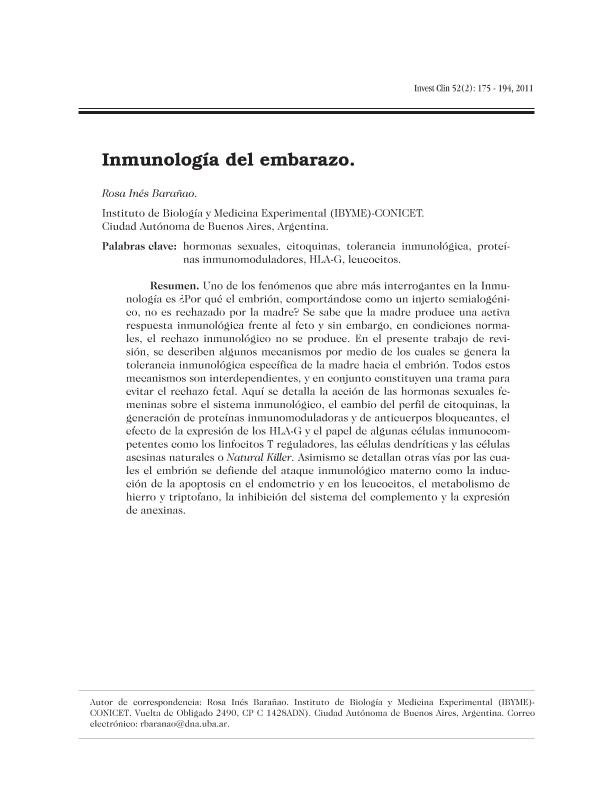Mostrar el registro sencillo del ítem
dc.contributor.author
Barañao, Rosa Ines

dc.date.available
2016-12-28T17:12:55Z
dc.date.issued
2011-06
dc.identifier.citation
Barañao, Rosa Ines; Inmunología del embarazo; Universidad de Zulía; Investigación Clínica; 52; 2; 6-2011; 174-193
dc.identifier.issn
0535-5133
dc.identifier.uri
http://hdl.handle.net/11336/10485
dc.description.abstract
Uno de los fenómenos que abre más interrogantes en la Inmunología es ¿Por qué el embrión, comportándose como un injerto semialogénico, no es rechazado por la madre? Se sabe que la madre produce una activa respuesta inmunológica frente al feto y sin embargo, en condiciones normales, el rechazo inmunológico no se produce. En el presente trabajo de revisión, se describen algunos mecanismos por medio de los cuales se genera la tolerancia inmunológica específica de la madre hacia el embrión. Todos estos mecanismos son interdependientes, y en conjunto constituyen una trama para evitar el rechazo fetal. Aquí se detalla la acción de las hormonas sexuales femeninas sobre el sistema inmunológico, el cambio del perfil de citoquinas, la generación de proteínas inmunomoduladoras y de anticuerpos bloqueantes, el efecto de la expresión de los HLA-G y el papel de algunas células inmunocompetentes como los linfocitos T reguladores, las células dendríticas y las células asesinas naturales o Natural Killer. Asimismo se detallan otras vías por las cuales el embrión se defiende del ataque inmunológico materno como la inducción de la apoptosis en el endometrio y en los leucocitos, el metabolismo de hierro y triptofano, la inhibición del sistema del complemento y la expresión de anexinas.
dc.description.abstract
One of the phenomena that offers more questions in Immunology is: Why the embryo, behaving like a semialogenic graft, is not rejected by the mother? It is known that the mother produces an active immunological response against the fetus and, nevertheless, in normal conditions, the immunological rejection does not take place. In the present work of revision, some mechanisms are described by means of which the specific immunological tolerance of the mother is generated towards the embryo. All these mechanisms are interdependent and altogether they constitute a safety network to avoid the fetal rejection. Here the effects of female sex hormones on the immunological system, the change of the profile of cytokines, the generation of immunomodulating proteins and blocking antibodies, the effect of the expression of the HLA-G and the paper of some cells, like Regulatory T lymphocytes, dendritic and Natural Killer cells, are detailed. Also other routes by which the embryo defends itself of the maternal immunological attack are described, like the induction of apoptosis in the endometrium and leukocytes, the tryptophan and iron metabolisms, the inhibition of the complement system and the expression of annexins.
dc.format
application/pdf
dc.language.iso
spa
dc.publisher
Universidad de Zulía
dc.rights
info:eu-repo/semantics/openAccess
dc.rights
Atribución-NoComercial-CompartirIgual 2.5 Argentina (CC BY-NC-SA 2.5 AR)
dc.rights.uri
https://creativecommons.org/licenses/by-nc-sa/2.5/ar/
dc.subject
Embarazo
dc.subject
Tolerancia
dc.subject
Leucocitos
dc.subject
Citoquinas
dc.subject
Sex Hormones
dc.subject
Cytoquines
dc.subject.classification
Inmunología

dc.subject.classification
Medicina Básica

dc.subject.classification
CIENCIAS MÉDICAS Y DE LA SALUD

dc.subject.classification
Obstetricia y Ginecología

dc.subject.classification
Medicina Clínica

dc.subject.classification
CIENCIAS MÉDICAS Y DE LA SALUD

dc.title
Inmunología del embarazo
dc.title
Immunology of pregnancy
dc.type
info:eu-repo/semantics/article
dc.type
info:ar-repo/semantics/artículo
dc.type
info:eu-repo/semantics/publishedVersion
dc.date.updated
2016-12-27T20:13:00Z
dc.journal.volume
52
dc.journal.number
2
dc.journal.pagination
174-193
dc.journal.pais
Venezuela

dc.journal.ciudad
Maracaibo
dc.description.fil
Fil: Barañao, Rosa Ines. Consejo Nacional de Investigaciones Científicas y Técnicas. Instituto de Biología y Medicina Experimental (i); Argentina
dc.journal.title
Investigación Clínica

dc.relation.alternativeid
info:eu-repo/semantics/altIdentifier/url/http://www.scielo.org.ve/scielo.php?script=sci_arttext&pid=S0535-51332011000200008
Archivos asociados
